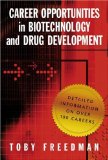As you know, I am a huge believer that doing self-study and learning about the pharmaceutical industry job you hope to fill is an important step in preparing for a successful job search. These are just some quick links to books that might be helpful in finding a job in the pharmaceutical industry.
These books cover a wide range, from general pharmaceutical career advice, to detailed specifics about business development, pharmaceutical sales, medical science liaisons, clinical research, regulatory affairs and medical writing. I will follow up on each of these books in more detail in future posts.
Read the rest of this entry »
Posted: March 13th, 2011 | Author: Headhunter | Filed under: Business Development, Clinical research, Clinical Research Associates, Medical Science Liaisons, Regulatory affairs, Resources, Sales | No Comments »
The Regulatory Science program at the University of Southern California offers a variety of graduate certificates, a Masters program, and a new Doctorate geared towards regulatory affairs professionals. In the Regulatory Science program, students learn how to guide medical products and foods through the complex regulatory and reimbursement paths required to bring them to market. Regulatory Affairs is an incredibly important part of the drug development process, and in a very real sense plays the key role in determining the success or failure of a drug development program. Ultimately, it’s a company’s regulatory affairs team that must make the case to the FDA that a drug is safe, effective, and deserves to be on the market.
Read the rest of this entry »
Posted: February 21st, 2009 | Author: Headhunter | Filed under: Education, Regulatory affairs | Tags: career, dayinthelife, glossary, regulatory, Regulatory affairs | No Comments »

Here’s another great resource for your pharmaceutical job search: Career Opportunities in Biotechnology and Drug Development, by Toby Freedman.
Freedman has put together a solid resource for finding jobs and developing your career in the biotechnology and pharmaceutical industry. At 409 hardcover pages, this isn’t the kind of book you can slip in a pocket to browse on the subway — it’s a comprehensive guide that I could see being an invaluable aide to finding your first job in the biotech industry.
Early chapters on resume writing and interview techniques, including informational interviewing, are brief but well-written and useful. If you’ve read a lot of career guides, these chapters probably aren’t going to teach you anything you haven’t heard before. The real meat of this book is the industry-specific information that follows.
In an excellent overview chapter, Freedman explains the breadth of the industry, and summarizes the different product development pathways followed by therapeutic, nontherapeutic, and medical device companies.
Next, individual chapters, each about 20 pages long, cover a wide range of career pathways: drug discovery, preclinical research, project management, clinical development, medical affairs, regulatory affairs, quality assurance and quality control, operations, product development, business development, sales, marketing, and corporate communications. Chapters on executive management, legal affairs, finance, management consulting and even recruiting round out this comprehensive guide.
Each chapter includes ‘snapshots’ of various roles and offers a thoughtful analysis of both the positive and negative aspects of a given job. For example, in clinical development, Freedman notes that “Original and applied clinical research is exciting. Outcomes are unknown until trials are completed, and each trial is unique. Your work is close to the market”, but “There is frequent pressure to meet constantly looming deadlines, and the objectives often seem to be ‘too much, too soon, with too little'”. When you’re just starting out, and trying to decide what path to follow, knowing the downside of a job can be very useful information.
Naturally, salaries and compensation are a matter for discussion, as is the potential for career development, and a look at how future trends might influence job security for each role is useful in today’s economic times.
Perhaps most usefully for job seekers, Freedman clearly lays out job requirements and typical pathways into the role, and offers tips that could be helpful for getting one’s foot in the door. Descriptions of what it takes to excel in a role, and qualities common to good candidates are also helpful.
This guide isn’t cheap, and it isn’t very portable — but if you are looking for a career in the pharmaceutical and biotech sector, this book should be at your side.
Posted: January 14th, 2009 | Author: Headhunter | Filed under: Clinical research, Interviewing, Marketing, Medical Science Liaisons, Preclinical R&D, Regulatory affairs, Resources, Resumes & CVs | Tags: biotechnology, book review, career, freedman, jobsearch | No Comments »
Signing up for a formal academic program is one way to put yourself on the fast track to a career in pharmaceutical regulatory affairs.
The Regulatory Affairs Professionals Society (RAPS) is a great clearinghouse of information. If you’re interested in a career in regulatory affairs, it’s a great place to learn more about the role. Membership isn’t cheap ($185), but it is significantly discounted for current students, and includes a subscription to Regulatory Focus magazine, discounts on educational programs, and access to networking opportunities. RAPS offers online courses that may help give you the knowledge you need to land an entry-level role and maintains a list of degree and certificate programs offered at academic institutions worldwide.
Read the rest of this entry »
Posted: January 13th, 2009 | Author: Headhunter | Filed under: Industry associations, Regulatory affairs, Training | Tags: Education, industry association, RAPS, regulatory, Regulatory affairs | 2 Comments »




